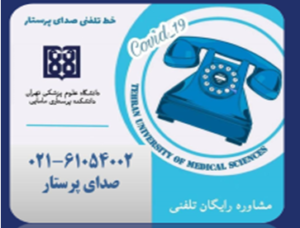The Nurse’s Voice: Providing counseling and training services during the COVID-19 pandemic, Iran

Due to the Coronavirus pandemic and the resulting social constraints, many people in need of healthcare cannot go to health centres in person. On the other hand, many healthy people are concerned about COVID-19 disease and want to talk to a reliable health source about their concerns, such as if they are infected and are in quarantine at home and how to look after themselves. People with chronic illnesses need extra counseling and support. In order to fulfill this social responsibility, the lecturers at the School of Nursing and Midwifery at the Tehran University of Medical Sciences went beyond their educational duties with students to launch a community help line for counselling and educating people in their homes about their conditions. Callers are referred to relevant health centres if necessary to identify cases that need to be assessed in person.
The helpline, known as the “Nurse’s Voice”, was started f with the Coronavirus outbreak on 23 March 2020 withthe cooperation of nursing and midwifery faculty members. The telephone help lineprovides counselling on general and specialist issues for six to eight hours daily. During the rest of the time, counselling is provided through WhatsApp text messaging. Each client is provided with a code so that their answer can be shared with the WhatsApp group, while maintaining anonymity. If necessary, the Nurse’s Voice calls the clients and refers them to physicians for further examination.
The psychiatric nursing group is very active, providing daily mental health Nurse’s Voice services to support highly stressed patients.
Nursing students actively participated in the WhatsApp counselling by delivering questions from the group to the lecturers and then providing the answers back via WhatsApp. Many people learned from reading the answers to questions posed, and felt confident in the group. Most people learned about the group from friends, demonstrating the the importance of awareness of peer groups in health education.
Due to the popularity of the WhatsApp Nurse’s Voice counselling group, in September 2020, , special WhatsApp groups were formed to educate and advise patients with diabetes, asthma and spinal cord injuries. The students of different nursing programmes joined the group and provide the education and counseling to people.
During the first seven months, more than 2000 calls to the Nurse’s Voice were recorded from all over the country. More than 700 questions were answered in the first seven months, and these are being analysed quantitatively and qualitatively to update the frequently asked questions brochure. Feedback has shown that people considered the Nurse’s Voice as a reassuring and soothing voice, a point of reliance, and a way to connect to the world of health and care. Nurse’s Voice has also reach people in remote areas who would not easily have access to support and advice from nurses and midwives.
The School of Nursing and Midwifery is now working to improve the telephone counseling system for nursing and midwifery groups, and plans to expand the scope of patient education to other virtual platforms.

